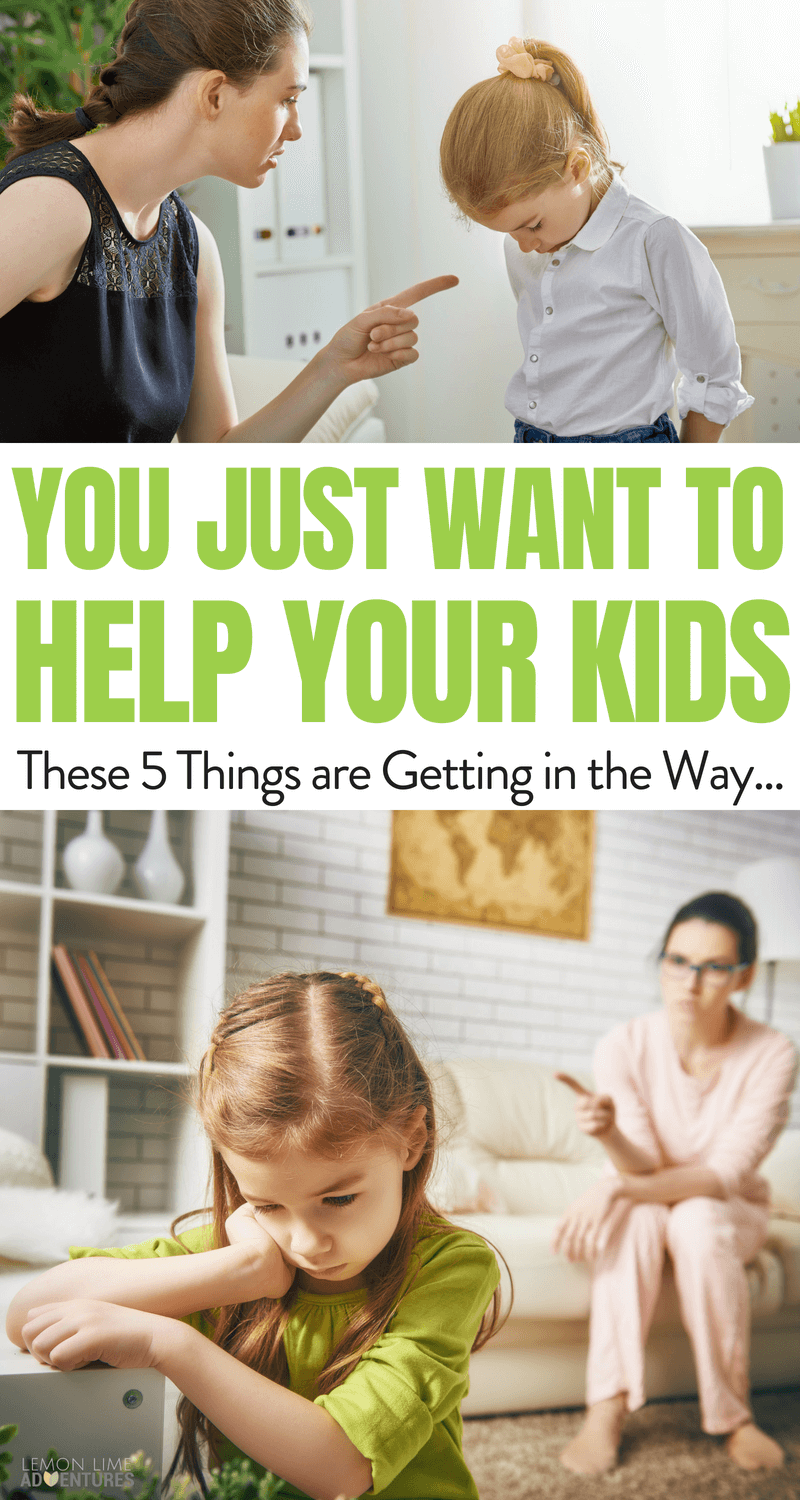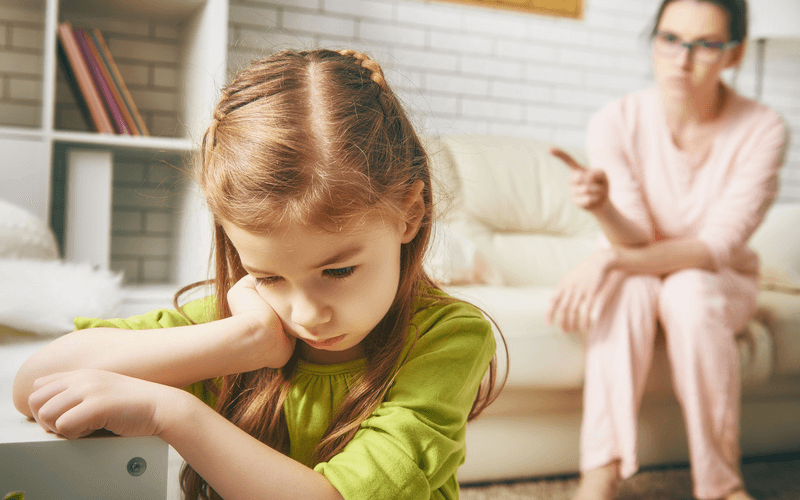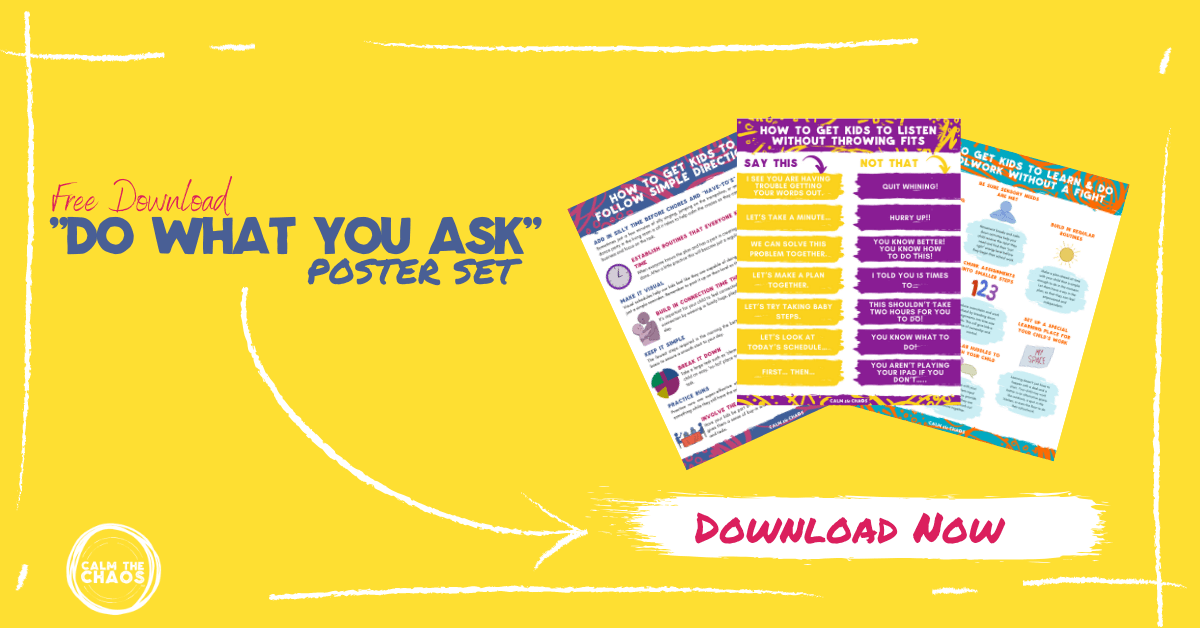(Inside: You want to help your kids, but these 5 things are getting in the way. Find out 5 parenting traps that keep you from helping your kids with their behaviors.)
“Stop it!”
“Why can’t you just behave?”
“Knock it off!”
When you were growing up, your parents, grandparents, and teachers probably said all of those things and more to you.
I know mine did.
And if you’re like most parents, you may have heard things like that come out of your own mouth when your kid starts acting up…
You’re just trying to help your kids, but there are five things that might be getting in the way…

*This post may contain affiliate links. Please see disclosure for details.
You Just Want to Help Your Kids… These 5 Things May be Getting in the Way…
When our kids are struggling with certain behaviors it’s easy to fixate on what we’re seeing. The hitting, the kicking, the biting, the lying…
It’s easy to let those beliefs we have about discipline and parenting take over when you really want to help your kids.
Not to mention all of the memories of when we were kids of the way our parents, grandparents, and teachers talked to us when we misbehaved.
Their words were ingrained in us and were a part of making us who we are.
Sometimes those things are awesome and amazing, but sometimes they are exactly the things that keep us from changing our mindset and from seeing our children’s behaviors as a cry for help, and as nothing more than communication.
But over and over again I find a few specific beliefs that get in our way when we’re trying to help our kids…
#1 You’re Too Old for This Behavior…
We tend to have this idea that by a certain age kids should act a certain way, and they should be able to do a certain thing.
We see this everywhere, from child development, to skills, and even behaviors.
How often have you heard something like “you’re 10 years old, you should not be throwing a fit right now” or “You’re four, you know how to use your words”?
When our kids are little, we give them a wide range. Maybe they crawl at 6 months, maybe it doesn’t happen for months after that. Maybe they’ll walk at 9 months, maybe not until 15 months. We know they develop skills on their own time.
But when they start to get older, we start thinking that all these emotional behaviors should go away because our kids should have developed their self regulation, their flexible thinking, their ability to self regulate.
We immediately go to our old thinking and we think, you are this age and it should be solved by now, so you struggle to help your kids because you think they should already do it themselves.
#2 Negative Behaviors Just Need Punishment
The next thing I see happen all the time that gets in the way of helping our kids is the belief that behavior should be met with punishment.
So if our kids are having a really hard time and they are throwing a tantrum, or they have a meltdown at the grocery store, or they refuse to go to school, then we should meet that with punishment.
That is what a lot of us grew up seeing when we were struggling with our flexible thinking or we were struggling with some of our own emotions, we were given a punishment.
So you fall back on your experiences and give a stern punishment instead of being able to help your kids.

#3 Adults Should Be Respected, But What About Kids?
Pretty much everyone agrees that adults should be respected, but that sometimes gets us stuck in this old belief that when our kids do something, they’re being “disrespectful”.
What we hear is “oh my gosh, this kid is so disrespectful. How dare they say this to me? How dare they act this way? I can’t believe them” and we take offense.
In reality, they’re saying, “help me, help me.”
Then when we try to talk to them, they come back with a rebuttal, and we think that they’re being disrespectful to us.
In reality, they’re still developing that communication, and learning how to navigate these talks.
There is always something going on behind the behavior that we can uncover if we’re able to put our emotions aside.
#4 Kids Will Be Kids, Right?
This one is probably the one that I’m the most guilty of… Kids will be kids.
They’re just being active… They’re just impulsive… They’re just… You get it.
So if you have a child who blurts out things that are completely inappropriate when people come around, or you have a child who gets wound up and overly excited whenever you’re around other people…
A lot of times the first reaction is, “Oh, kids will be kids. Just let them be. It’ll be fine.”
And when we say that we can miss some real concerns…
- I don’t know how to regulate.
- I get really worked up and really excited because I’m anxious or because I’m worried or because I’m nervous.
- I don’t know how to bring it back down to a level one or level two to stay calm and stay regulated.
- I just want to enjoy the party with everybody else.
So sometimes we avoid stepping in because we want our kids to enjoy their childhood, and we can still let our kids be active and run wild and free.
But we need to still see that there is a need, that they still need help regulating their energy levels and regulating their emotions.

#5 They Behave for Grandma, So The Problem Must be Me
I can’t count the number of times I’ve had parents reach out to me because their kids behave at school, at grandma’s, when dad’s home, but when they’re with mom they just lose it and have a meltdown.
So when you hear from teachers, babysitters, extended family that your child is a completely different person when you aren’t around, there are a few things you could be missing.
First is that we could miss some reasons that our kids are behaving better for others. Maybe there’s more routine at school, or maybe they get more one-on-one attention with grandma.
On the flip side, you can get so discouraged that it seems like your child can behave for everyone else besides you that you miss the most common reason…
They feel comfortable showing those emotions and they hold it in when they’re with their teacher, babysitter, or grandma.
Then when they are around you again, they let it all go because they know you’ll love them regardless. They feel safest with you, so they feel like they can relax and take off the mask.
So, if I could tell you one thing today, it would be to make sure that when your child starts to act out and struggles with big behaviors, I want you to take a step back and try to figure out what that behavior really means.
Because your child’s behaviors are much like this iceberg. On the surface you see…
* a child that is clingy and doesn’t like to be alone,
* a child that crosses his arms and shuts down
* a child that is scared of ever getting a wrong answer
* a child that doesn’t like to go new places
Or a child that becomes “hyper” when new guests arrive at your house.
It’s easy to look at these behaviors as just what we see. It’s easy to make assumptions about why our children are acting out or doing inexplicable things.
However, I challenge you to look for the other 85%. Look deeper.
Right now you can download a FREE Poster Pack on how to get your kids to listen and follow directions.
These posters give you tips on how to get your kids to do what you ask, without refusing, running away, or ignoring you! Download your poster pack here.





